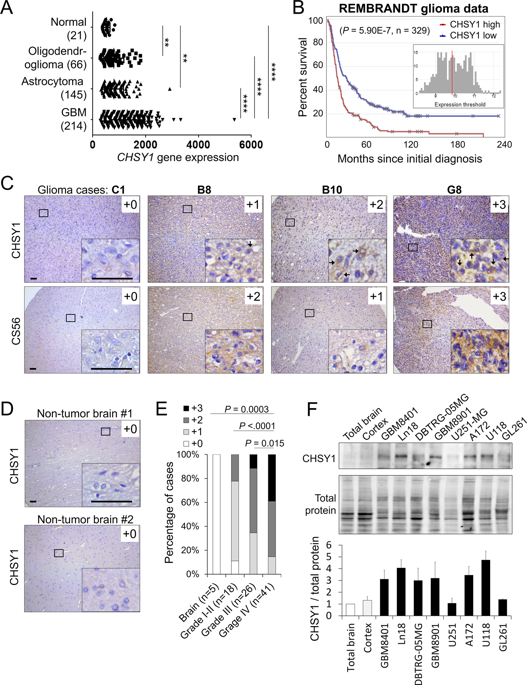当前位置:
X-MOL 学术
›
Oncogenesis
›
论文详情
Our official English website, www.x-mol.net, welcomes your feedback! (Note: you will need to create a separate account there.)
Chondroitin sulfate synthase 1 enhances proliferation of glioblastoma by modulating PDGFRA stability.
Oncogenesis ( IF 6.2 ) Pub Date : 2020-02-04 , DOI: 10.1038/s41389-020-0197-0 Wen-Chieh Liao,Chih-Kai Liao,To-Jung Tseng,Ying-Jui Ho,Ying-Ru Chen,Kuan-Hung Lin,Te-Jen Lai,Chyn-Tair Lan,Kuo-Chen Wei,Chiung-Hui Liu
Oncogenesis ( IF 6.2 ) Pub Date : 2020-02-04 , DOI: 10.1038/s41389-020-0197-0 Wen-Chieh Liao,Chih-Kai Liao,To-Jung Tseng,Ying-Jui Ho,Ying-Ru Chen,Kuan-Hung Lin,Te-Jen Lai,Chyn-Tair Lan,Kuo-Chen Wei,Chiung-Hui Liu

|
Chondroitin sulfate synthases, a family of enzyme involved in chondroitin sulfate (CS) polymerization, are dysregulated in various human malignancies, but their roles in glioma remain unclear. We performed database analysis and immunohistochemistry on human glioma tissue, to demonstrate that the expression of CHSY1 was frequently upregulated in glioma, and that it was associated with adverse clinicopathologic features, including high tumor grade and poor survival. Using a chondroitin sulfate-specific antibody, we showed that the expression of CHSY1 was significantly associated with CS formation in glioma tissue and cells. In addition, overexpression of CHSY1 in glioma cells enhanced cell viability and orthotopic tumor growth, whereas CHSY1 silencing suppressed malignant growth. Mechanistic investigations revealed that CHSY1 selectively regulates PDGFRA activation and PDGF-induced signaling in glioma cells by stabilizing PDGFRA protein levels. Inhibiting PDGFR activity with crenolanib decreased CHSY1-induced malignant characteristics of GL261 cells and prolonged survival in an orthotopic mouse model of glioma, which underlines the critical role of PDGFRA in mediating the effects of CHSY1. Taken together, these results provide information on CHSY1 expression and its role in glioma progression, and highlight novel insights into the significance of CHSY1 in PDGFRA signaling. Thus, our findings point to new molecular targets for glioma treatment.
中文翻译:

硫酸软骨素合酶1通过调节PDGFRA稳定性增强胶质母细胞瘤的增殖。
硫酸软骨素合酶是硫酸软骨素(CS)聚合反应中涉及的一种酶,在各种人类恶性肿瘤中均失调,但它们在神经胶质瘤中的作用仍不清楚。我们对人神经胶质瘤组织进行了数据库分析和免疫组化,以证明CHSY1的表达在神经胶质瘤中经常被上调,并且与不良的临床病理特征相关,包括高肿瘤分级和不良生存。使用硫酸软骨素特异性抗体,我们显示CHSY1的表达与神经胶质瘤组织和细胞中CS的形成显着相关。此外,在胶质瘤细胞中过表达CHSY1增强了细胞活力和原位肿瘤的生长,而CHSY1沉默抑制了恶性肿瘤的生长。机理研究表明,CHSY1通过稳定PDGFRA蛋白水平来选择性调节神经胶质瘤细胞中PDGFRA的活化和PDGF诱导的信号传导。在克诺拉尼中抑制PDGFR活性可降低CHSY1诱导的GL261细胞恶性特征,并延长原位神经胶质瘤小鼠模型的存活时间,这突显了PDGFRA在介导CHSY1作用中的关键作用。综上所述,这些结果提供了有关CHSY1表达及其在神经胶质瘤进展中的作用的信息,并突出了关于CHSY1在PDGFRA信号传导中的意义的新颖见解。因此,我们的发现指向神经胶质瘤治疗的新分子靶标。在克诺拉尼中抑制PDGFR活性可降低CHSY1诱导的GL261细胞恶性特征,并延长原位神经胶质瘤小鼠模型的存活时间,这突显了PDGFRA在介导CHSY1作用中的关键作用。综上所述,这些结果提供了有关CHSY1表达及其在神经胶质瘤进展中的作用的信息,并突出了对CHSY1在PDGFRA信号传导中的意义的新颖见解。因此,我们的发现指向神经胶质瘤治疗的新分子靶标。在克诺拉尼中抑制PDGFR活性可降低CHSY1诱导的GL261细胞恶性特征,并延长原位神经胶质瘤小鼠模型的存活时间,这突显了PDGFRA在介导CHSY1作用中的关键作用。综上所述,这些结果提供了有关CHSY1表达及其在神经胶质瘤进展中的作用的信息,并突出了关于CHSY1在PDGFRA信号传导中的意义的新颖见解。因此,我们的发现指向神经胶质瘤治疗的新分子靶标。
更新日期:2020-02-04
中文翻译:

硫酸软骨素合酶1通过调节PDGFRA稳定性增强胶质母细胞瘤的增殖。
硫酸软骨素合酶是硫酸软骨素(CS)聚合反应中涉及的一种酶,在各种人类恶性肿瘤中均失调,但它们在神经胶质瘤中的作用仍不清楚。我们对人神经胶质瘤组织进行了数据库分析和免疫组化,以证明CHSY1的表达在神经胶质瘤中经常被上调,并且与不良的临床病理特征相关,包括高肿瘤分级和不良生存。使用硫酸软骨素特异性抗体,我们显示CHSY1的表达与神经胶质瘤组织和细胞中CS的形成显着相关。此外,在胶质瘤细胞中过表达CHSY1增强了细胞活力和原位肿瘤的生长,而CHSY1沉默抑制了恶性肿瘤的生长。机理研究表明,CHSY1通过稳定PDGFRA蛋白水平来选择性调节神经胶质瘤细胞中PDGFRA的活化和PDGF诱导的信号传导。在克诺拉尼中抑制PDGFR活性可降低CHSY1诱导的GL261细胞恶性特征,并延长原位神经胶质瘤小鼠模型的存活时间,这突显了PDGFRA在介导CHSY1作用中的关键作用。综上所述,这些结果提供了有关CHSY1表达及其在神经胶质瘤进展中的作用的信息,并突出了关于CHSY1在PDGFRA信号传导中的意义的新颖见解。因此,我们的发现指向神经胶质瘤治疗的新分子靶标。在克诺拉尼中抑制PDGFR活性可降低CHSY1诱导的GL261细胞恶性特征,并延长原位神经胶质瘤小鼠模型的存活时间,这突显了PDGFRA在介导CHSY1作用中的关键作用。综上所述,这些结果提供了有关CHSY1表达及其在神经胶质瘤进展中的作用的信息,并突出了对CHSY1在PDGFRA信号传导中的意义的新颖见解。因此,我们的发现指向神经胶质瘤治疗的新分子靶标。在克诺拉尼中抑制PDGFR活性可降低CHSY1诱导的GL261细胞恶性特征,并延长原位神经胶质瘤小鼠模型的存活时间,这突显了PDGFRA在介导CHSY1作用中的关键作用。综上所述,这些结果提供了有关CHSY1表达及其在神经胶质瘤进展中的作用的信息,并突出了关于CHSY1在PDGFRA信号传导中的意义的新颖见解。因此,我们的发现指向神经胶质瘤治疗的新分子靶标。


























 京公网安备 11010802027423号
京公网安备 11010802027423号